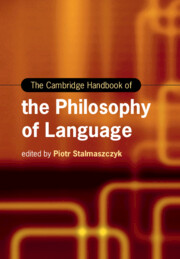Book contents
- The Cambridge Handbook of the Philosophy of Language
- Cambridge Handbooks in Language and Linguistics
- The Cambridge Handbook of the Philosophy of Language
- Copyright page
- Contents
- Figures
- Tables
- Contributors
- Preface
- 1 Philosophy of Language: Definitions, Disciplines, and Approaches
- Part I The Past, Present, and Future of Philosophy of Language
- 2 The History of the Philosophy of Language before Frege
- 3 How the Philosophy of Language Grew Out of Analytic Philosophy
- 4 Philosophy of Language for the Twenty-First Century
- Part II Some Foundational Issues
- Part III From Truth to Vagueness
- Part IV Issues in Semantics and Pragmatics
- Part V Philosophical Implications and Linguistic Theories
- Part VI Some Extensions
- References
- Index
2 - The History of the Philosophy of Language before Frege
from Part I - The Past, Present, and Future of Philosophy of Language
Published online by Cambridge University Press: 12 November 2021
- The Cambridge Handbook of the Philosophy of Language
- Cambridge Handbooks in Language and Linguistics
- The Cambridge Handbook of the Philosophy of Language
- Copyright page
- Contents
- Figures
- Tables
- Contributors
- Preface
- 1 Philosophy of Language: Definitions, Disciplines, and Approaches
- Part I The Past, Present, and Future of Philosophy of Language
- 2 The History of the Philosophy of Language before Frege
- 3 How the Philosophy of Language Grew Out of Analytic Philosophy
- 4 Philosophy of Language for the Twenty-First Century
- Part II Some Foundational Issues
- Part III From Truth to Vagueness
- Part IV Issues in Semantics and Pragmatics
- Part V Philosophical Implications and Linguistic Theories
- Part VI Some Extensions
- References
- Index
Summary
While ancient Indian and Chinese theological and philosophical thought included significant reflections on the nature of mind, language, and logic, and Sumerian, Babylonian, and Assyrian scribes kept vocabulary lists and translation manuals, European linguistics and philosophy of language are rooted in ancient Greek philosophy. Greek philosophers were the first to record generalizations about language that included reflections on the nature and sources of the meaning of natural language (Law, 2003: 14). Pre-Socratic writings already contain fragmentary reflections on linguistic meaning. Heraclitus distinguishes between speech and action and maintains that intelligible speech must be law-governed just as a city-state needs strong laws (Freeman, 1983: 24 and 32). Parmenides identifies empty names, for example “Becoming,” because only Being exists, and human beings should not have “established the custom” of using such names (Freeman, 1983: 44).
- Type
- Chapter
- Information
- The Cambridge Handbook of the Philosophy of Language , pp. 51 - 70Publisher: Cambridge University PressPrint publication year: 2021



